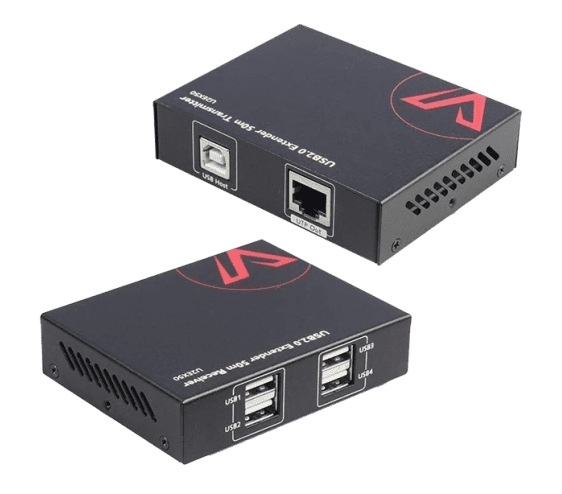If you work in a church band or do live performances, you will be familiar with the on-stage equipment setup and know how USB extension could play a critical role to pull things together.
What’s a USB Extender?
USB extenders usually refer to the technology of USB extension via ethernet. A USB extender consists of two boxes, a transmitter(TX) and a receiver(RX) and they extend the USB signals from your host device to the peripheral devices via a CAT cable.
Most USB cables served on the market are no longer 2 meters (6.6 feet); a USB extender over ethernet normally could transmit USB signals up to 50–60 meters.
Read more: What Is a USB Extender? How Does it Work?
USB Extender in the Home Studio
Sometimes a home studio could be rather efficient and small and you may not always need to extend USB cables. While if you want to place your audio interface on a certain media rack that is close enough to your instrument but distant from your computer, a USB extender is necessary.
If you are setting up a really professional home studio and have instruments from multiple stances to connect to, long cables are inevitable — not only USB cables but also audio cables. USB extenders are also widely used in churches to help connect the audio interface to the laptop, or the MIDI controller.
USB Extension Considerations
When people are using a USB extender, their most concerns are 1) latency; and 2) unstable data transmission.
If the data would be processed (for example, compression and decompression) during the transmission, it is possible to cause some latency. In most cases, this latency would be strictly tested and controlled by the manufacturer.
As long as you are not using a bunch of extra high-power USB peripherals altogether, a qualified USB extender can easily handle the signals from a keyboard, a mouse, a microphone, and a camera.
The power supply is a serious problem. USB signals may encounter voltage loss during long-distance travel. Therefore, the voltage the USB hub supported is extremely important if you do use high-power peripherals.
Another thing is, to keep the cable as short as possible. Don’t take extra length. When using USB extenders, it’s important to ensure that the total length of the cable (including the extender) does not exceed the maximum recommended length for USB connections.
This is because longer cables can cause signal degradation, resulting in low-quality audio and data transfer rates.
AV Access USB Extender
AV Access U2EX50 is a basic USB extender, an excellent pick concerning the value for money. And it does serve our musician clients well. We’d love to share with you the feedback we got from our client and he did explain how a USB extender is used in his church stage setup.

“This USB extension solution is perfect for my application. Using two sets of these and have had no issues. I use one at my church to run USB from my stage location back to the equipment rack where we have a PlayAudio 12 set up. The second set is used to connect a keyboard midi controller to the PlayAudio 12…Definitely give these a try if you need USB 2.0 (or 1.1) over a long distance.”
Conclusions
Overall, USB extenders can be a useful tool in a home studio setup to provide greater flexibility in the placement of your microphone, audio interface, MIDI controller, and other home studio equipment. It helps streamline your workflow. And high-quality USB extension could stream stable signals and keep you away from problems like audio drop-outs or signal latency.
More Resources
- How to Use a USB Extender to Control Telescope from a Distance?
- USB Extender — A Useful Tech to Beat the Max. Length Limit of USB Cables
- USB Extenders vs. Passive Cables vs. Active Cables
- Differences between USB Extenders and USB to Ethernet Adapters
Original copy: https://www.avaccess.com/blogs/guides/usb-extender-in-home-studio/

